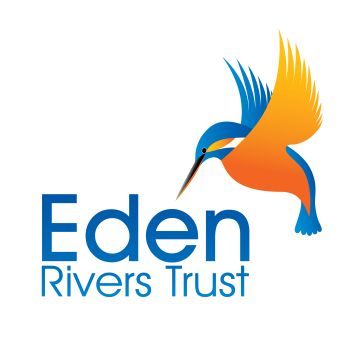The health of the River Petteril has declined since the 1950’s but could now be improving. This was the consensus from an event organised by Eden Rivers Trust, to learn about the history of this local river and look at ways of improving it for wildlife.
Pollution from road accidents, road run-off and farms were generally suspected as being responsible for the decline in the numbers of fish in the River Petteril. River straightening, construction work to upgrade the railway and A6, and low summer river flows were also thought to be causes. The insect life was noticed to change over time, with those requiring clean water disappearing and those tolerant of less clean conditions thriving.
The River Petteril flows from near Greystoke, west of Penrith, into the River Eden at Carlisle.
Seventeen interested local people gathered at Eden Rivers Trust offices in February to discuss the past history and future prospects of the River Petteril. These included local anglers, riverside land owners and staff from the Environment Agency, Cumbria Wildlife Trust and Eden Rivers Trust.
Memories of the River Petteril were gleaned from those present, mainly from the 1950’s onwards. It was said to be full of trout in the 1950’s, right from Carlisle all the way up to the top. It was normal to be able to catch 10 fish a day from the Petteril in the 1960’s. Stuart Kinnear of Penrith Anglers said, “Anyone who could fish could catch them.” Subsequently fishing declined so much that Penrith Anglers gave up the tenancy of the Petteril waters at that time but now have it back again. Terry Cousin, a local angler said, “Now catching two fish in a day is good.”
 ERT has carried out annual surveys for juvenile salmon and trout for the past seven years with generally very poor results – no salmon fry and only occasional stretches in the headwaters with young trout. However the 2009 surveys saw a marked improvement, with salmon fry found as far upstream as Calthwaite and young trout in good numbers at some sites.
ERT has carried out annual surveys for juvenile salmon and trout for the past seven years with generally very poor results – no salmon fry and only occasional stretches in the headwaters with young trout. However the 2009 surveys saw a marked improvement, with salmon fry found as far upstream as Calthwaite and young trout in good numbers at some sites.
The water quality, as indicated by the different insects present, was now thought to be improving. Kingfishers and dippers, good indicators of river health, also seem to be doing well now. These positive signs may be linked to recent wet winters and summers, and the increased number of floods along the river, which have a cleansing and diluting effect.
Simon Johnson, Trust Director, said, “We’ve talked about where we are today – and things seem to be better this year. If there is anything resembling a recovery – it’s fragile and can be wiped out in an instant. The decline of the Petteril seemed to begin sometime during the 1960’s due to a number of factors including the development of the M6, farm intensification and a series of pollution events. The river has lost its capacity to recover between pollution events and its recovery is thought to be hindered by its lack of tributaries. We hope that ERT’s project, with everyone’s support, will mean that the blows become less severe. We now have some money for the Petteril – not nearly enough – but great support from the EA. Fishing clubs, Brackenburgh Estate and others are also very supportive.”
Farming practices have changed over time and these changes can be damaging to the river. Farms have become more intensive and have more animals, there has been a move from manure to slurry, and there has been increased drainage of the uplands and lowlands. Many of these problems are now being addressed through legislation requiring better management of slurries and manures, advice on best farming practice and environmental stewardship schemes.
Future plans to improve the Petteril include habitat improvement schemes such as riverside fencing and tree planting. Anyone interested in carrying these out on their land can contact Alison Reed at Eden Rivers Trust on tel. no. 01768 866788 or email Alison@edenriverstrust.org.uk.
There are man made barriers on some of the small tributaries of the river which prevent fish from migrating upstream. These will be identified and where possible removed or bypassed. This will help to increase the length of river accessible to fish and so hopefully increase their numbers.
Alien, invasive plants such as Himalayan balsam and Japanese knotweed will also be targeted for action along the River Petteril. These aggressive introduced plants take over our river banks and shade out our native plants.
Eden Rivers Trust would also be delighted to hear from anyone with any old records relating to the River Petteril. The Trust is seeking ongoing funding to improve the condition of this river. It is looking for lots of local support – solving the Petteril’s problems needs everyone to get involved in their own backyards and raise awareness of the plight of this potentially beautiful river.
Terry Cousin, a local angler, said, “The beauty of the Petteril is that it is the nearest thing in the county to a chalk stream. The river’s good, but it’s a fragile environment and could be gone tomorrow.”
If you would like to learn more about the River Petteril project or the work of Eden Rivers Trust in general, you can visit www.edenriverstrust.org.uk. Alternatively, email Alison Reed – Alison@edenriverstrust.org.uk – or telephone the office, which is at Skirsgill Business Park, Penrith, on tel. no. 01768 866788.








